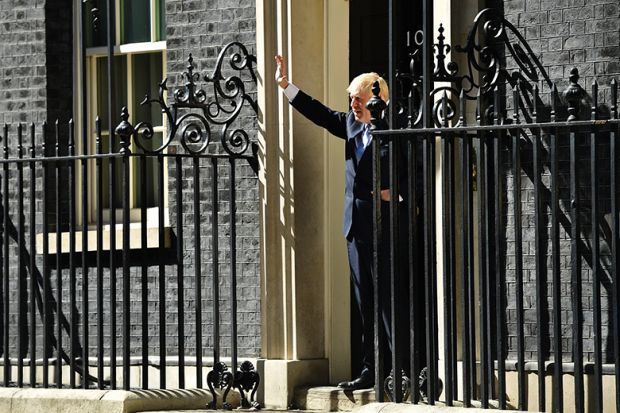The turnover of UK universities ministers has been so frequent in recent years that writing substantive reviews of their achievements and legacies is difficult.
In a blog post last week, Geoff Mulgan, professor of collective intelligence, public policy and social innovation at UCL, argued that the shortening of ministerial tenures was a major problem.
“The average tenure of many ministerial roles is barely a year now. Since it takes a year for even a smart minister to learn how to do the job, the result is that most ministers, most of the time, are incompetent,” he said.
Mulgan was talking generally, not about the universities and science role, which saw more change last month when Chris Skidmore was sacked in the reshuffle and the job was split in two.
Even allowing for the fact that he had two tilts at the job, Skidmore’s total tenure lasted barely more than a year, which was inevitably a limiting factor, although he was more than competent.
Rather than cast judgement on his 400-day split shift, this week we hear Skidmore’s own view of his time in office, and the priorities that he believes face his successors.
Writing in our features pages, he describes his approach thus: “I felt that I had to try to steer the relationship between government and the sector into a better place.
“No more university-bashing for the sake of a few cheap headlines. What would be the point? It was clear to me that our universities are a world-leading success.
“We want them to be even stronger, more globally competitive, for the future, with the value of a UK degree being considered one of our vital assets.
“Of course, that still means challenging the sector to do even better, but with a change in approach and a change of tone, I knew that I was more likely to enact real change, to encourage reform and to work productively on actual solutions, rather than simply sending out press releases calling for them.”
This tallies with what the sector saw, briefly, of Skidmore. Indeed, one reading of his time in office, and his ultimate removal, is that Skidmore was too effective a supporter of universities for a No 10 operation keen to take back control of everything – including ministerial autonomy.
In his blog, Mulgan argues that short terms of office are bad, but worse still is “the new government’s predilection for briefing the media that ministers could be sacked at any moment, and its use of the recent reshuffle to signal that loyalty and compliance matter more than effectiveness”.
The spotlight on what happens next under the new universities minister, Michelle Donelan, and the new science minister, Amanda Solloway, will have to be viewed through this filter.
Elsewhere in this week’s issue, we learn more about the potential reshaping of the research landscape, and in particular the role that it could play in plans for the north of England, with both excitement and wrangling over the future of the Advanced Manufacturing Research Centre.
Currently based at the University of Sheffield, this rightly prized network of research and innovation centres seems a strong contender to be the foundation for a proposed “MIT of the North”.
The AMRC model is said to be highly regarded by the prime minister’s adviser and strategist Dominic Cummings.
The idea of a supercharged AMRC, co-located across the north of England, has been put forward by northern leaders, with input from northern universities, as a way to fast-track the “levelling up” agenda, which will seek to drive economic growth across the region.
The idea will prove contentious with Sheffield, which has its own proposals about how to capitalise on the success of the AMRC, but it reflects the renewed focus at the very heart of government on using research, in particular, to drive its domestic and economic agenda.
It would seem churlish to complain about being the centre of attention – that is where universities, science and research deserve to be, and where the country needs them to be.
But the commitment to move from spending 1.7 per cent to 2.4 per cent of gross domestic product on research and development will not be catch-free. And the loss of a committed minister, who had taken time to learn his brief and had won trust in the sector, will keep universities on their toes. Perhaps that’s the point.
Register to continue
Why register?
- Registration is free and only takes a moment
- Once registered, you can read 3 articles a month
- Sign up for our newsletter
Subscribe
Or subscribe for unlimited access to:
- Unlimited access to news, views, insights & reviews
- Digital editions
- Digital access to THE’s university and college rankings analysis
Already registered or a current subscriber? Login


